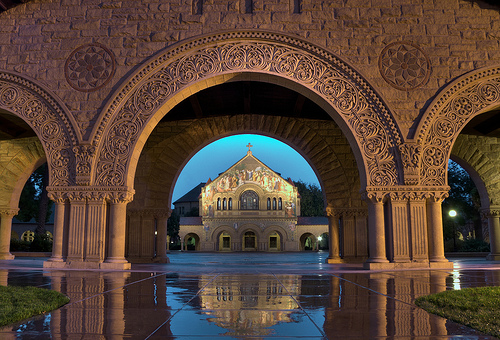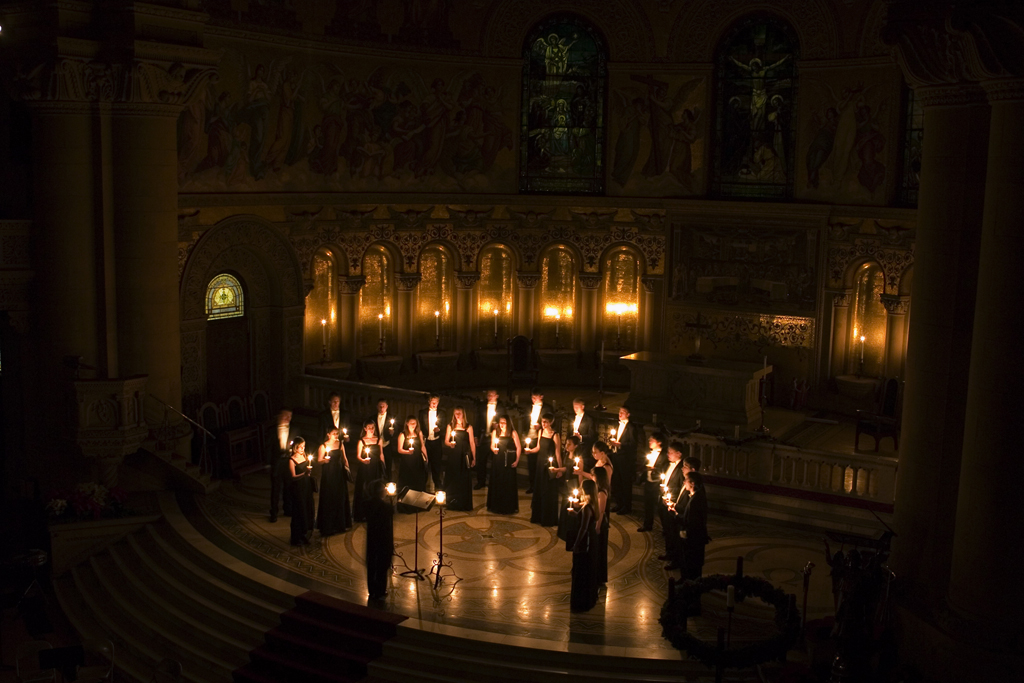This talk was given at the Convocation of the Latter-day Saint Community at Stanford University on October 16th 2012 in the Memorial Church. The annual Convocation of the Latter-day Saint community at Stanford University gathers all Stanford alumni, faculty, staff, affiliates, students, parents, and friends of Stanford who are spread across the various wards and stakes throughout the Bay Area and beyond.
Standing in front of you here is an awe inspiring view. A group of people of faith in the middle of one of the top ranked universities. This is thanks in part to Jane Stanford, who insisted that this church be the centerpiece of campus while the architect wanted it to be a library.1 This likely seems strange to many who believe that faith and reason are antithetical, as seems to be the current Western Zeitgeist. Some may say that we must pick a side: faith or reason. Even if they are right, even if faith and reason are in fact antithetical, even if there is a deep and impassible chasm between them, how different is this from the chasm between our human condition and our concept of God? We see this chasm bridged through the atonement or at-one-ment of Christ. Can such an at-one-ment also work in the dilemma of faith and reason?
I love how Mormonism approaches atonement. Not only is atonement something which the Son of God wrought, but it is a process in which we are invited to participate. We do so in many ways. Our sealing ordinances are a form of atonement, as individuals are sealed or welded together. We have a strong concept of ‘gathering’ which is another form of atonement, as a people once scattered are brought together again as one people. I also see Mormonism as very effectively working an at-one-ment with faith and reason.
The Doctrine and Covenants teaches many things regarding this. We learn that we should seek diligently from the best books of wisdom, by study and faith.2 We learn that whatever principle of intelligence we attain unto in this life will rise with us in the resurrection and will be an advantage to us there.3 We learn that in fact, the Glory of God is intelligence.4
The last year of his life, Joseph Smith gave two principles which he called “the grand fundamental principles of Mormonism.”5 The first was truth. He said “One of the grand fundamental principles of Mormonism is to receive truth, let it come from where it may.”6 This then as a fundamental principle frees us to accept truths that may even seem to contradict our faith. This says that we don’t choose the side of faith or the side of reason, but rather we must choose the side of truth as manifested in faith and reason. Joseph said: “Have the Presbyterians, Methodists, Baptists any truth? Embrace it. Get all the good in the world, and you will come out a pure Mormon.”7
We need not fear truths gained from reason, but rather we must embrace them in order to be, as Joseph said, ‘pure Mormons.’ How do we know what of faith and reason are truth? Joseph said: “we have a right to embrace all, and every item of truth… when that truth is clearly demonstrated to our minds, and we have the highest degree of evidence of the same.”8 So with the 13th article of faith we follow of the admonition of Paul by seeking all truths and gathering or sealing them into one great whole.9
Now, I’m going to venture a guess that few if any here are guilty of not seeking out intellectual truths. If anything I’m guilty of over-focusing and interpreting even inconsequential information with a scientific approach. At times I even see things in equations. For example, when I read section 93 of the Doctrine and Covenants with phrases like “intelligence, or in other words light and truth” my brain sees: intelligence= light + truth. But if you do that to the whole section it is virtually impossible to make all the equations work as a set. Yet recently I had the following impression: what if most of the variables here are actually synonyms? What if truth = intelligence = the essence of our very being. Then “the glory of God is intelligence” can also read “the glory of God is humans/us/his children.”10
Using B. H. Roberts tripartite model of the soul, we see that our bodies are shells, vehicles, or temples for our spirits, and our spirits are the same type of vessels for our “intelligence.”11 Intelligence is the core of our very being, of our very selves. We read in Section 93 that intelligence is light and truth.12 We further read that “All truth [and intelligence] is independent in that sphere in which God has placed it, to act for itself”13 which is the same way Lehi speaks of people and agency in 2nd Nephi, when he says that man is independent, or an agent, placed on earth to act for himself.14 What if the most important truths we are to seek out, to gather or seal into one great whole, are our fellow human beings?
This fits very well with the other “grand fundamental principle of Mormonism:” friendship. Joseph placed the virtue of friendship, or love, above other virtues: “[I] don’t care what a [man’s] character is if he’s my friend.—a friend a true friend . . . I will be a friend to him[.] Friendship is the grand fundamental principle of Mormonism. It will revolutionize and civilize the world.”15
If we accept this exegesis, this Mormon metaphysics, then the most important truths for us to embrace in our lives are the light and truth of every human soul. This is not a simple task. We instinctively divide into groups and assert our group boundaries by drawing lines of exclusion. As groups we fight against each other and we ‘truths’ separate ourselves rather than bringing each other “at-one.” We create and maintain these differences rather than seeking to bridge them. The political left versus the right, people of faith versus atheists, people of faith versus ‘apostates’ who have left their fold; all are chasms that we are to strive to bridge as Mormons through friendship, and in keeping with our ideals to gather, seal, and create an at-one-ment to bring humanity into one great whole.
So as we continue our efforts to seek for further light and knowledge, to seek for greater intelligence, let us remember that the most important intelligence that we seek to gain and gather are our fellow human beings, especially when a chasm separates us. As we strive to live the grand fundamental principles of Mormonism, let us seek all truth and intelligence and seal them into one great whole. I say these things in the name of the author of the at-one-ment, Jesus Christ, Amen.
1 http://janestanford.stanford.edu/values.html
2 Doctrine and Covenants 88:118 and Doctrine and Covenants 109:7
3 Doctrine and Covenants 130:18-19
4 Doctrine and Covenants 93:36
5 I’ve only found two instances of Joseph calling something a “grand fundamental principle of Mormonism”
6 Sermon delivered at the Nauvoo temple grounds on Sunday July 9, 1843
7 Sermon delivered at Nauvoo, Ill. on July 23, 1843
8 Joseph Smith to Isaac Galland, March 22, 1839
9 See 1st Corinthians 13:7, Ephesians 1:10, and the 13th article of faith.
10 Doctrine and Covenants 93:36
11 “Spirit and Mind” post at ByCommonConsent written by Jonathan Stapley
12 See Doctrine and Covenants 93 verses 29 and 36.
13 Doctrine and Covenants 93:29-30
14 For the same phrases see verses 16 and 26 of 2nd Nephi Chapter 2. For the whole section alluded to see verses 11-27.
15 Sermon delivered at Nauvoo, Ill. on July 23, 1843








Loved it Geoff! This was great: “Have the Presbyterians, Methodists, Baptists any truth? Embrace it. Get all the good in the world, and you will come out a pure Mormon.” Such a great message.
Geoff,
I loved it! Your insights on atonement are thought provoking and unique. Absolutely loved it. Thank you for sharing with us.
Mike
THAT is fantastic.
I struggle a lot with some of the points in this post. Not because they are bad points but I feel that as a church we have gone away from seeking truth no matter where that truth lies. Our exclusive views towards our beliefs compared to other truths, religions, data, etc are often placed in such high regard that it is hard from a cultural Mormon standpoint today to accept the many beautiful truths that exist in this wonderful world.
I think the part that rang most true to me is this: “Joseph placed the virtue of friendship, or love, above other virtues. I don’t care what a man’s character is if he is my friend – a friend a true friend…I will be a friend to him. Friendship is the grand fundamental principal of Mormonism.” I love this! And my heart aches at the same time to know that so many are willing to place judgement over friendship in mormonism. We have lost to a large degree our ability to truly be friends with one another because we are so worried about our checklists of righteousness. If only we could be better friends one with another!
Garrett,
I can understand that those feelings. I felt I could have gone further discussing conflicts of reason and faith, but I felt content let people read between the lines. This really represents my approach to things. There was a time I felt severe tension between my mormon faith and reason (in the form of science, philosophy, theology, etc.) but when I actually accepted Joseph’s statement that truth is a ‘grand fundamental principle of mormonism’ ‘let it come from where it may’ then I finally felt free to accept truths even when they ‘seem’ by every stretch of my understanding to contradict the teachings of my faith. This is pure mormonism in my mind.
For many though, this alone can simply shift all of the tension from an internal struggle to a struggle with other members of their faith and with the organization itself. This is where the other ‘fundamental principle of mormonism’ can sort of grease the wheels. I certainly can’t say it solves the tension, but it eases it. I’m convinced that love/friendship can help heal this tension between the individual and the organization (or those who comprise the organization). I don’t think it can always work, but I think it’s the best hope.
In any case, I share your frustration and look forward to a time when as Mormons we’ll rise to our potential.
Geoff,
I keep coming back to read your talk so I figured it’s time to leave a comment. There are few things that inspire me more than to study, learn, read, or discuss than the atonement. It truly is infinitive and you have pointed that out in a way that I had not realized (which happens more often than I’d like to admit!). So thank you for the wonderful message about the atonement, love and friendship.
This was such a great message and so well written. Thank you! This is why I love Mormonism.
Excellent perspective